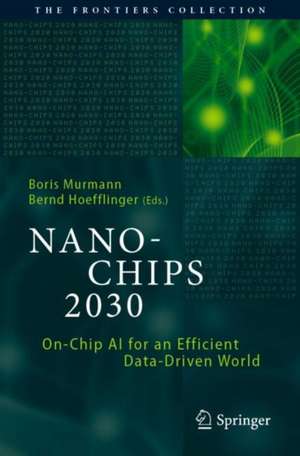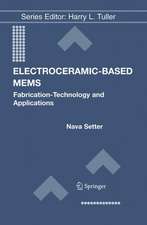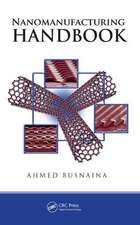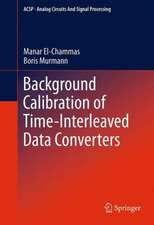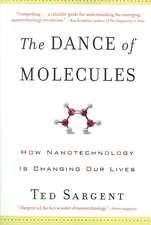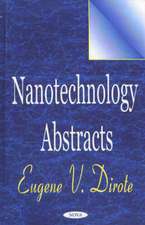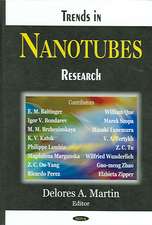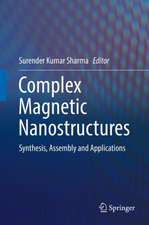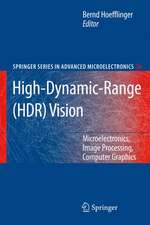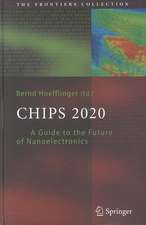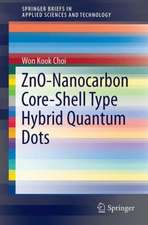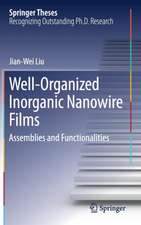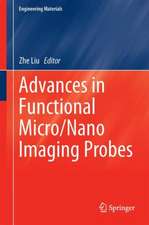NANO-CHIPS 2030: On-Chip AI for an Efficient Data-Driven World: The Frontiers Collection
Editat de Boris Murmann, Bernd Hoefflingeren Limba Engleză Paperback – 16 iul 2021
| Toate formatele și edițiile | Preț | Express |
|---|---|---|
| Paperback (1) | 717.96 lei 39-44 zile | |
| Springer International Publishing – 16 iul 2021 | 717.96 lei 39-44 zile | |
| Hardback (1) | 717.96 lei 39-44 zile | |
| Springer International Publishing – 9 iun 2020 | 717.96 lei 39-44 zile |
Din seria The Frontiers Collection
-
 Preț: 308.36 lei
Preț: 308.36 lei - 17%
 Preț: 366.23 lei
Preț: 366.23 lei - 20%
 Preț: 340.49 lei
Preț: 340.49 lei - 17%
 Preț: 493.42 lei
Preț: 493.42 lei -
 Preț: 312.94 lei
Preț: 312.94 lei -
 Preț: 323.05 lei
Preț: 323.05 lei -
 Preț: 395.47 lei
Preț: 395.47 lei -
 Preț: 297.61 lei
Preț: 297.61 lei - 17%
 Preț: 525.36 lei
Preț: 525.36 lei -
 Preț: 215.30 lei
Preț: 215.30 lei -
 Preț: 351.90 lei
Preț: 351.90 lei -
 Preț: 355.86 lei
Preț: 355.86 lei -
 Preț: 396.40 lei
Preț: 396.40 lei - 20%
 Preț: 501.18 lei
Preț: 501.18 lei -
 Preț: 225.86 lei
Preț: 225.86 lei -
 Preț: 298.66 lei
Preț: 298.66 lei -
 Preț: 283.50 lei
Preț: 283.50 lei -
 Preț: 270.71 lei
Preț: 270.71 lei -
 Preț: 321.30 lei
Preț: 321.30 lei -
 Preț: 271.81 lei
Preț: 271.81 lei - 5%
 Preț: 383.93 lei
Preț: 383.93 lei - 15%
 Preț: 536.96 lei
Preț: 536.96 lei -
 Preț: 500.84 lei
Preț: 500.84 lei -
 Preț: 492.74 lei
Preț: 492.74 lei - 15%
 Preț: 590.16 lei
Preț: 590.16 lei - 15%
 Preț: 543.98 lei
Preț: 543.98 lei - 15%
 Preț: 604.37 lei
Preț: 604.37 lei - 15%
 Preț: 640.24 lei
Preț: 640.24 lei -
 Preț: 401.79 lei
Preț: 401.79 lei -
 Preț: 388.34 lei
Preț: 388.34 lei -
 Preț: 390.63 lei
Preț: 390.63 lei - 15%
 Preț: 478.05 lei
Preț: 478.05 lei - 15%
 Preț: 475.15 lei
Preț: 475.15 lei - 15%
 Preț: 534.36 lei
Preț: 534.36 lei -
 Preț: 389.49 lei
Preț: 389.49 lei -
 Preț: 493.85 lei
Preț: 493.85 lei -
 Preț: 394.29 lei
Preț: 394.29 lei -
 Preț: 459.92 lei
Preț: 459.92 lei
Preț: 717.96 lei
Preț vechi: 944.69 lei
-24% Nou
Puncte Express: 1077
Preț estimativ în valută:
137.45€ • 143.41$ • 115.22£
137.45€ • 143.41$ • 115.22£
Carte tipărită la comandă
Livrare economică 10-15 martie
Preluare comenzi: 021 569.72.76
Specificații
ISBN-13: 9783030183400
ISBN-10: 3030183408
Pagini: 592
Ilustrații: XXIII, 592 p. 374 illus., 296 illus. in color.
Dimensiuni: 155 x 235 mm
Greutate: 1 kg
Ediția:1st ed. 2020
Editura: Springer International Publishing
Colecția Springer
Seria The Frontiers Collection
Locul publicării:Cham, Switzerland
ISBN-10: 3030183408
Pagini: 592
Ilustrații: XXIII, 592 p. 374 illus., 296 illus. in color.
Dimensiuni: 155 x 235 mm
Greutate: 1 kg
Ediția:1st ed. 2020
Editura: Springer International Publishing
Colecția Springer
Seria The Frontiers Collection
Locul publicării:Cham, Switzerland
Cuprins
New Programs after the End of the Nanometer Roadmap.- Real-World Electronics.- Silicon Complementary MOS (CMOS) Technology in its 7th Decade.- The Future of Ultra-Low-Power SOTBC CMOS.- Energy-Efficient and High-Throughput Digital CMOS.- Update on Monolithic 3D Integration.- Heterogeneous 3D Integration.- 3D High-Speed Memories Enabling the AI Future.- Minimum Nano-Features with EUV Lithography.- Acquisition of Information.- Machine-Learning Inference.- Multi-Sensor, Intelligent Microsystems.- 3D for efficient, Application-Specific Circuits (ASICs and FPGAs).- Field-Programmable Arrays.- Coarse-Grained Reconfigurable Architectures.- Graphics-Accelerators and –Processors.- 1,000x Improvement of the Processor-Memory Gap.- Supercomputers.- Deep Learning On-Chip.- Digital Neural Networks.- Brain-Inspired Spiking-Neurons Systems.- Energy-Autonomous Chip-Systems.- Wearable and Implanted Chips.- Electronics for the Human Visual System.- Subretinal Implants in their Third Decade.- Updateon Perception-Inspired HDR Video.- High-Dynamic-Range and High-Color Gamut Video.- Augmented and Virtual Reality.- Machine-Learning for Robotics - Hardware Requirements for Care Robots.- Prospects of Quantum Computing.- Man-Machine Cooperation and Cognitronics.
Notă biografică
Bernd Hoefflinger became an Assistant Professor at Cornell University, Ithaca, NY, USA, after completing his Ph.D. at the Technical University of Munich, Germany. He was a co-founder of the MOS Division of Siemens in Munich, and founded the Electrical Engineering Department of the University of Dortmund, Germany, which houses the first Ion-Implanted BiCMOS production line. After serving as Head of the Electrical Engineering Departments at the University of Minnesota and then at Purdue University in Indiana, he established the Institute of Microelectronics Stuttgart, Germany, as the first ISO 9000-certified research and manufacturing facility – a leader in ASICs, HDR vision, and e-beam-driven nanotechnology.
Boris Murmann received his Ph.D. degree from the University of California, Berkeley, in 2003, and serves as a Professor of Electrical Engineering at Stanford University. His research interests are in mixed-signal integrated circuit design, with a focus on sensor interfaces, data converters, and custom circuits for embedded machine learning. He has served as an Associate Editor of the IEEE Journal of Solid-State Circuits, an AdCom member and a Distinguished Lecturer of the IEEE Solid-State Circuits Society, as well as the Data Converter Subcommittee Chair and the Technical Program Chair of the IEEE International Solid-State Circuits Conference (ISSCC). He is a Fellow of the IEEE.
Boris Murmann received his Ph.D. degree from the University of California, Berkeley, in 2003, and serves as a Professor of Electrical Engineering at Stanford University. His research interests are in mixed-signal integrated circuit design, with a focus on sensor interfaces, data converters, and custom circuits for embedded machine learning. He has served as an Associate Editor of the IEEE Journal of Solid-State Circuits, an AdCom member and a Distinguished Lecturer of the IEEE Solid-State Circuits Society, as well as the Data Converter Subcommittee Chair and the Technical Program Chair of the IEEE International Solid-State Circuits Conference (ISSCC). He is a Fellow of the IEEE.
Textul de pe ultima copertă
In this book, a global team of experts from academia, research institutes and industry presents their vision on how new nano-chip architectures will enable the performance and energy efficiency needed for AI-driven advancements in autonomous mobility, healthcare, and man-machine cooperation. Recent reviews of the status quo, as presented in CHIPS 2020 (Springer), have prompted the need for an urgent reassessment of opportunities in nanoelectronic information technology. As such, this book explores the foundations of a new era in nanoelectronics that will drive progress in intelligent chip systems for energy-efficient information technology, on-chip deep learning for data analytics, and quantum computing. Given its scope, this book provides a timely compendium that hopes to inspire and shape the future of nanoelectronics in the decades to come.
Caracteristici
Presents key elements of a new epoch in nanoelectronics that follows the end of the Nanometer Roadmap A timely compendium that will inspire and shape the future of nanoelectronics Explores the next generation of intelligent and energy-efficient chip-systems related to health and information technology Broadens perspectives of the existing chip-savvy audience while appealing to new readers in system design
